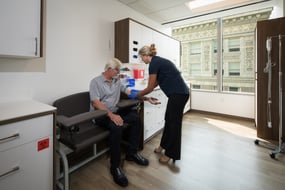Healthcare is shifting in rapid fashion, and healthcare professionals have been stretched particularly thin over the last 16 months. With change becoming the new normal in healthcare, as well as in everyday life, this post offers tips to help you navigate what comes next. You’ll also learn how Vera employees stay healthy in this Q&A with Vera Coach Quality Specialist Rachel Schieber.
Q: What strategies help medical professionals navigate changes in care delivery?
Rachel: I’d say creativity, a shift in perspective, and resilience.
Providers have had to use their creativity to adapt the way they provide care — as well as shift their perspective on what primary care looks like by adjusting to realities like more virtual care.
The pandemic demanded that healthcare providers do the unthinkable time and time again, and we’ve had to tap into that resilient spirit to make it through.
Q: For the person struggling with change, how can they work towards becoming more comfortable with it?
Rachel: We all struggle with change, and a common reason why we struggle is fear. To become more comfortable with change first requires us to identify what it is we are actually struggling with. What is the fear? Is it about the actual change, or is it about something deeper or perhaps more personal?
Change can be really hard. A new process disrupts our routines and requires us to work hard until that new change becomes the norm. So it helps to be curious, ask questions, and consider what's driving the change.
Q: What practices can you adopt in order to build resiliency?
Rachel: Mindfulness is probably the number one practice for building resiliency. Think about spending more time in nature as well as spending time doing things that you value.
Try some self-exploration. Ask yourself:
- What gives me energy?
- What drains my energy?
- When does my body and mind need a new boundary in place?
Then uphold those new and clear boundaries. It might be a boundary with ourselves, a friend, or a loved one. Upholding that boundary will allow our body and mind to trust ourselves in those delicate spaces.
And don’t forget to talk to someone.
Maybe it’s a family member or a friend, or maybe it’s a licensed mental health professional who can explore thought patterns that aren't serving you any longer. It’s important to acknowledge that as our life circumstances change, practices that we once relied on may not work in this time. Being okay with trying new things until we find healthier solutions for present circumstances will help all of us be more resilient people.
Q: What skills are important to develop to be better at managing internal care?
Rachel: It's valuable to first understand where we are on the adopter scale. Ask yourself, “Am I an innovator or a late adopter?”
Understanding where we are and what drives us to be in that state can be so valuable as we shift our perspectives. Build up workplace relationships so that you have a network of people you can seek out to help you manage life’s rougher patches.
Q: How can corporate cultures foster conversations and allow space for questions during uncertain times?
Rachel: At Vera, we have regularly scheduled “Team Esteem” meetings, which are something like a town hall in format. Since COVID hit, we've had COVID-related calls as well. We do feedback surveys. We have numerous channels to ask questions of leadership and provide feedback anonymously. And I think these are valuable components of a healthy corporate culture.
The other thing that Vera does well is give employees permission to not know the answers and inspire their confidence to say, "I don't have the answer to that question, but I'll get back to you on that." It's not only allowing for questions, it's also giving people permission to be unsure in the moment. Empowering employees to find the answer later relieves on-the-spot pressure — and it also gives us the confidence that we will find an answer.
Q: How does Vera help guide people through change?
Rachel: Vera offers space for feedback and transparency.
Everything really connects back to our mission, vision, and values. One value that we've been leaning on lately is, “Love those we serve.” Offering transparency and demonstrating a deep commitment to those we serve helps build up trust so that people actually believe what we're saying. Whether an employee perceives a change as positive or not, , Vera’s atmosphere is one that allows space for acceptance and growth.
Q: What kind of support can new Vera employees expect in this time of extraordinary change?
Rachel: They can expect to be given what they ask for and more.
One of the hardest things about starting a new position is knowing where to look for answers or information. Thankfully, we have resources for everything. New employees should feel encouraged to speak up and work with their managers to get what they need.
One of the first things that new employees go through is The Vera Way training, which is full of tools and resources that support new employees as they transition into life at Vera. It helps everyone align with our values and provides clarity and support so employees understand what to expect from the get-go. It’s an empathetic and transparent experience and a good introduction to Vera’s culture.
Learn how empathetic listening improves primary care patient outcomes by downloading our free white paper.
Sign up
Join our email list to receive the latest open positions, Vera Careers news, and more.





